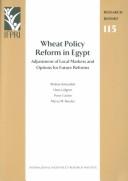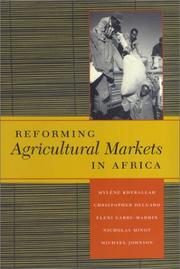| Listing 1 - 2 of 2 |
Sort by
|

ISBN: 0896291189 Year: 2000 Publisher: Washington, D.C. International Food Policy Research Institute
Abstract | Keywords | Export | Availability | Bookmark
 Loading...
Loading...Choose an application
- Reference Manager
- EndNote
- RefWorks (Direct export to RefWorks)
Plant husbandry --- Economic policy and planning (general) --- Third World: agricultural and food problems --- Egypt --- Blé --- Wheats --- Production --- Coût de production --- Production costs --- Adaptation de la production --- Adjustment of production --- Marché intérieur --- Domestic markets --- Politique de la production --- Production policies --- Food supply --- -Wheat trade --- -Wheat industry --- Grain trade --- Food control --- Produce trade --- Agriculture --- Food security --- Single cell proteins --- Government policy --- -Government policy --- -Food supply --- Wheat trade --- Wheat industry --- Developing countries: agricultural and food problems

ISBN: 0801871980 080187145X 9780801871986 9780801871450 Year: 2002 Publisher: Baltimore: Johns Hopkins University press,
Abstract | Keywords | Export | Availability | Bookmark
 Loading...
Loading...Choose an application
- Reference Manager
- EndNote
- RefWorks (Direct export to RefWorks)
The long-term reduction of hunger and poverty in Sub-Saharan Africa remains one of the great challenges for the international development community. Eliminating hunger and promoting widespread growth in the region inevitably involves agriculture, given its central role in the region's economies. Over the past 20 years, most African governments have carried out reforms to deregulate agricultural markets and reduce the role of state enterprises. How much has the state actually withdrawn from agricultural markets? Have well-functioning private markets emerged? How successful were these reforms in boosting agricultural production, economic growth, and the incomes of the rural poor? What lessons can we learn from the reform process? The authors of this book address these questions through an analysis based on an extensive review of experiences with reform, focusing on three major agricultural markets: fertilizer, food crops, and export crops. They examine the historical rationales for intervention, the factors contributing to reform, the process of implementation, and the impact of the reforms on farmers and consumers in Sub-Saharan Africa. The authors find that reforms have had many favorable results, but that the impact has been muted by partial implementation and structural constraints. They propose a new agenda for promoting the development of agricultural markets in Sub-Saharan Africa, identifying areas where governments can play a supportive role. They argue that appropriate agricultural marketing policies and investments can improve livelihoods and the economic health of the region.
Third World: agricultural and food problems --- Africa --- Food industry and trade --- Agriculture --- Economic aspects --- 339.13 --- 338.439.5 --- <6> --- Marktmechanisme. Markttheorie. Marktstructuur. Marktregulatietechnieken. Marktevenwicht. Disequilibrium van de markt. Marktfluctuatie. Marktelasticiteit. Oneerlijke concurrentie. Dumping. Antidumping --- Verkoop, handel en distributie in relatie tot voedselproductie en voedselbevoorrading --- Afrika --- Social Sciences and Humanities. Development Studies --- Development Economics --- Development Economics. --- <6> Afrika --- 339.13 Marktmechanisme. Markttheorie. Marktstructuur. Marktregulatietechnieken. Marktevenwicht. Disequilibrium van de markt. Marktfluctuatie. Marktelasticiteit. Oneerlijke concurrentie. Dumping. Antidumping --- Food preparation industry --- Food processing industry --- Food trade --- Agricultural processing industries --- Processed foods --- Food --- Food processing --- Food technology --- Processing --- Developing countries: agricultural and food problems --- Food industry and trade - Africa --- Agriculture - Economic aspects - Africa
| Listing 1 - 2 of 2 |
Sort by
|

 Search
Search Feedback
Feedback About UniCat
About UniCat  Help
Help News
News